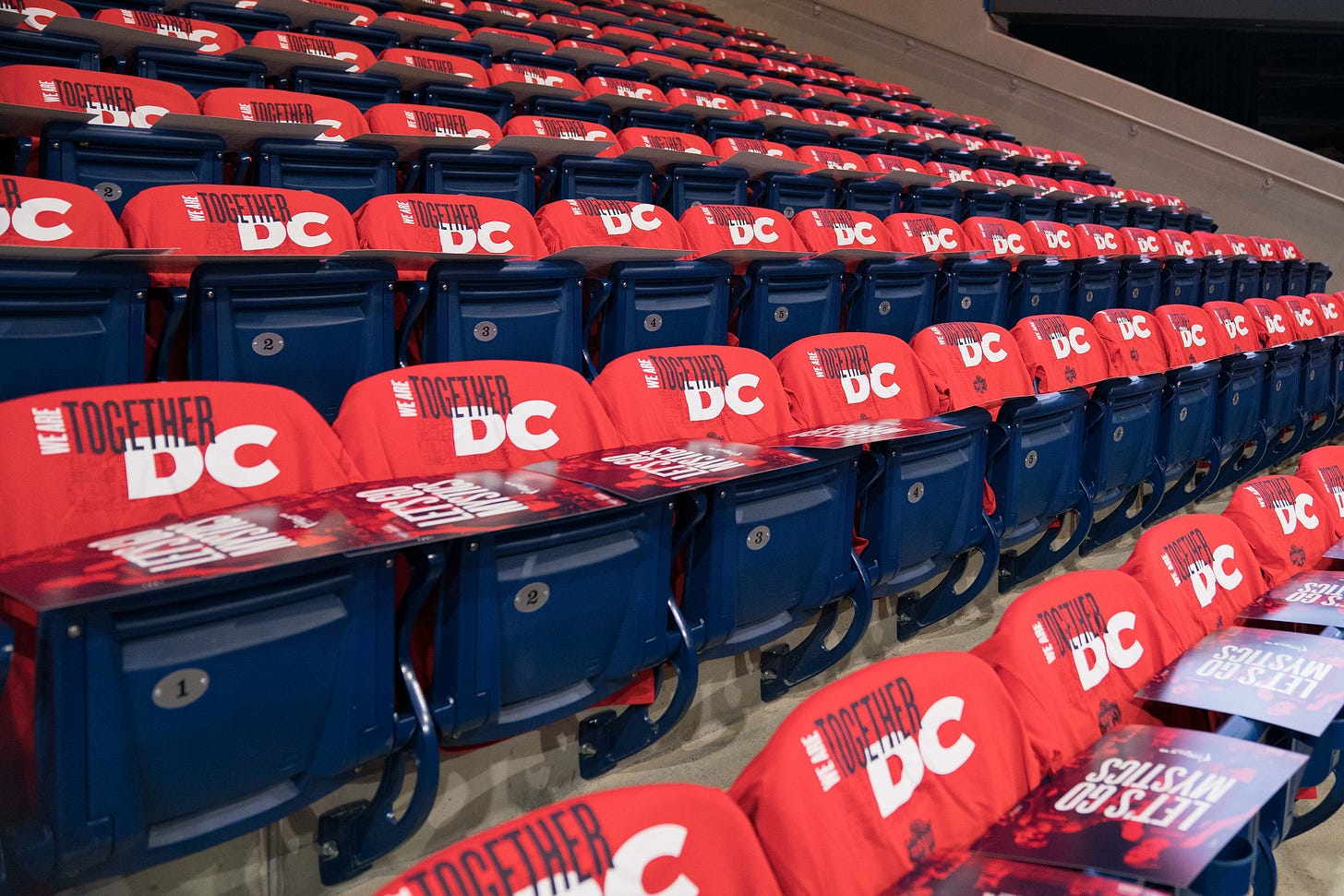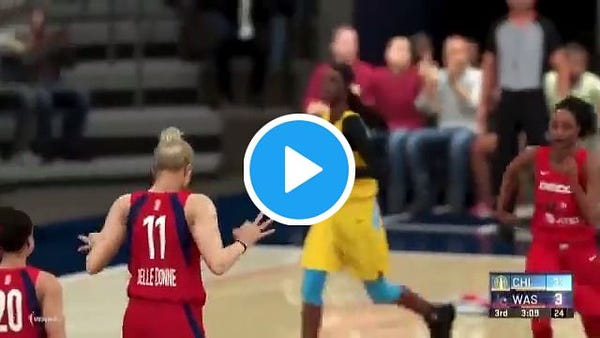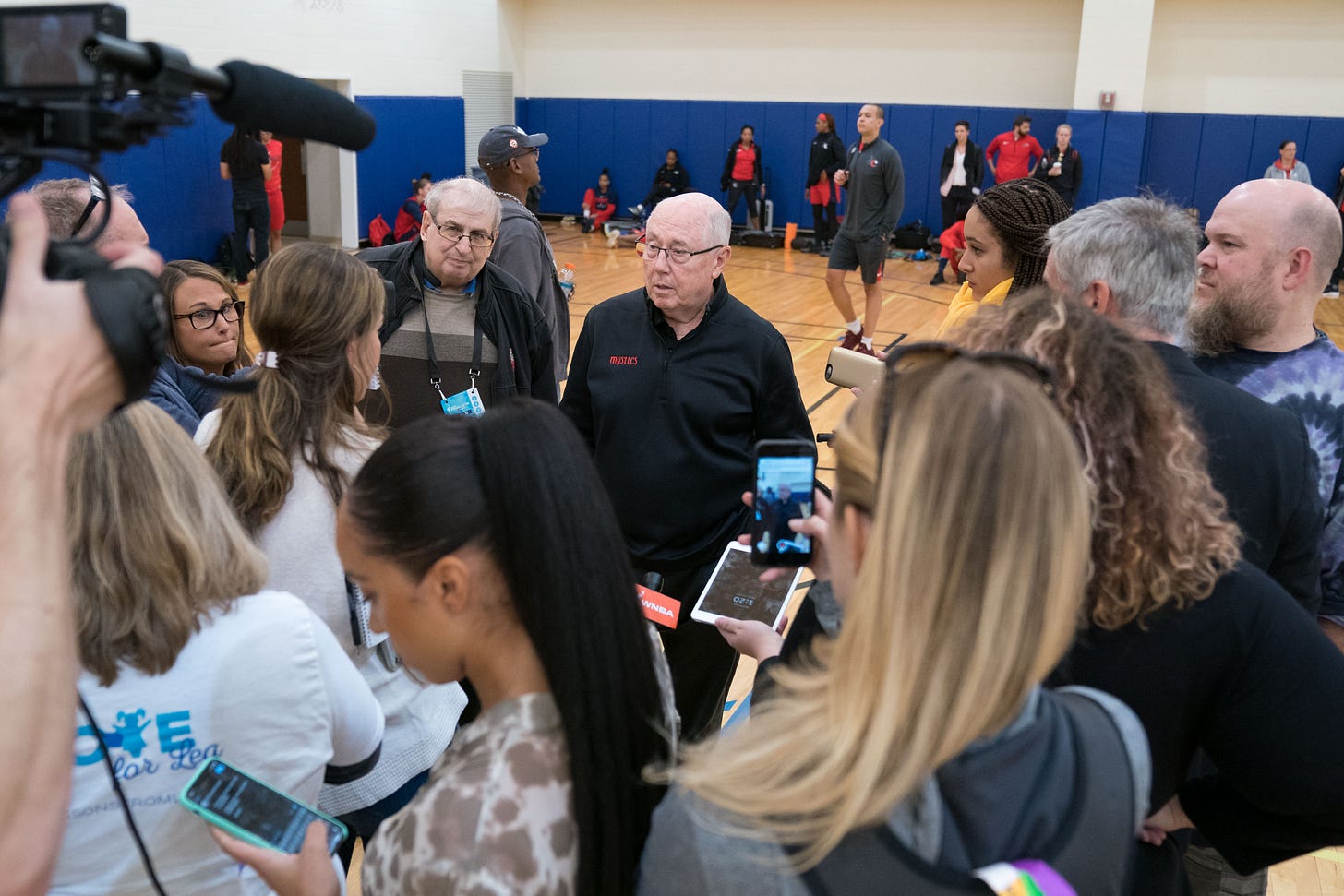How the Washington Mystics Broadcasters Are Riding Out the Coronavirus Pandemic
Without live sports, Meghan McPeak and Christy Winters-Scott have been temporarily sidelined
Thanks for reading the Her Hoop Stats Newsletter. If you like our work, be sure to check out our stats site, our podcast, and our social media accounts on Twitter, Facebook, and Instagram. You can also buy Her Hoop Stats gear, such as laptop stickers, mugs, and shirts!
Haven’t subscribed to the Her Hoop Stats Newsletter yet?
“It almost went from like a Category 1 or 2 hurricane … to a Category 5 in a split second.”
That was how Mystics play-by-play announcer Meghan McPeak described the scene on March 12, when the NBA abruptly suspended its season due to the coronavirus. She was at home between games for the Capital City Go-Go, a team in the NBA G League for which she also does play-by-play, and decided to watch the Utah Jazz play the Oklahoma City Thunder on NBA League Pass. “All of a sudden you see a medical [staff member] coming flying out on the floor to the referees and getting them to just halt everything. … I'll be honest: I wasn't even thinking of COVID-19. I was thinking someone had maybe a heart attack or a stroke … [like] the alternate official or something.”
McPeak’s broadcast partner with the Mystics, analyst Christy Winters-Scott, also watched sports disintegrate from home. She had just returned from calling the Big Ten women’s basketball tournament in Indianapolis and was slated to call the first four rounds of the NCAA Tournament. “I [was] watching the Big Ten men's tournament and they were saying, ‘We're not going to play,’” Winters-Scott recalled. “And … everything just stopped.”
The situation was especially scary for Winters-Scott because the Big Ten men’s tournament was being held at Bankers Life Fieldhouse in Indianapolis—the same arena she had been in just a few days prior. “[We were] walking around just like it was December, with no issues or no true concerns,” she said. “… So within a 48-hour span, I was kind of losing my mind.” Winters-Scott was especially concerned about passing the virus to her three children, but luckily, the whole family would remain healthy.
Three months later, both women are still at home in the DC area. Winters-Scott is with her family in Reston, Virginia, while McPeak is using FaceTime to bridge the distance between her and her brother and parents in Canada. McPeak revealed that a family member contracted “a very mild case” of coronavirus; that, along with the logistical challenges of crossing the border, contributed to her decision to remain in the United States. But even from afar, she marvels at the work of family members such as her cousin, a nurse who continued to work during the crisis despite being pregnant. “It's funny because they always, they think I'm the cool one in the family because of my job and my role,” McPeak said, “but this has kind of put in perspective that … every day [frontline workers] step into their job, they're putting their lives on the line. … As cool as my job is, they're much cooler.”
Winters-Scott has wrestled with grief over canceled events such as the NCAA Tournament and the Mystics’ championship parade. Beyond the lost income from the NCAA Tournament and WNBA season, she said, “to have those moments taken away was really tough professionally for me because I love it.” She is also experiencing the restlessness of having a suddenly wide-open schedule for the foreseeable future—a stark contrast from her previous routine of coaching high school basketball in addition to her broadcasting work. “I'm sitting on my hands and it's so hard because my kids are still in virtual school, my husband's working remotely here from home, and they all have something to do,” she said.

The Mystics had T-shirts and cheer cards ready for fans ahead of Game 1 of the 2019 WNBA Finals. Photo credit: Chris Poss
Unfortunately for McPeak and Winters-Scott, there have been limited opportunities to work during the pandemic as nearly all live sports are still paused. Monumental Sports, the ownership group of the Mystics, the Go-Go, and the NBA’s Washington Wizards, has helped pull off several virtual events, but those events are a drop in the bucket compared to what is normally available. Winters-Scott participated in a Facebook Live chat with Mystics head coach Mike Thibault during the premiere of a documentary on last season’s championship, while McPeak presided over a watch party of the pivotal Game 5, helped with this season’s virtual home opener, and has called a series of 2K simulations of Mystics games.
McPeak finds the simulated games to be a distinct experience from calling live games—and in some ways, more challenging. “Doing a game in person is a lot easier because you get the feel of the crowd and the players and what's happening on the floor,” she explained. “… I will say I prefer in-person and real life more than the video game.” But in both formats, the home team is dominating, following up last season’s title with an undefeated start in 2K.


Both women agreed that the fan response to the Mystics’ virtual events has been outstanding. “One cool thing about Mystics fans is, no matter what happens to the team, to players, to the world … they're always there,” McPeak said. “… I don't know if there’s other sports fans that are like that.” Winters-Scott can back that up: there was enough fan participation in the Facebook Live chat that she decided to continue the conversation on Instagram Live. “Reliving those moments with the fans, even though it's virtual, was really refreshing and it gave me a lot of life,” she said. On Instagram Live, the fans were also looking toward the future, peppering her with questions about the team’s trade for Tina Charles and the impact that the former WNBA MVP could have this season.
Like the fans, Winters-Scott and McPeak are waiting to see whether and when the WNBA will play its 2020 season. Neither has been consulted or informed about the decision-making process—and both said they prefer it that way because of how complicated the process is. “With this virus, it just seems like there are no absolutes,” Winters-Scott explained, “and when you're planning something like that, you need absolutes.” McPeak said she will “roll with” whatever decision comes, including going back to arenas if she is allowed. “If coaches, front offices, league people, players, if they agree to return to play because they feel it's safe enough, then why would it not be safe enough for me?” she asked. Winters-Scott agreed, adding that she would “want to know everything that I could” about the protocols but would “definitely” go as long as it is safe.
However, it is far from clear what media access will look like for any professional sports league. Winters-Scott speculated that leagues might structure interviews differently: instead of media scrums and locker room access, players and coaches could have microphones and speak from the stands to media members on the court, or vice versa, after games. Leagues may also restrict the number of media members allowed into arenas, which could make it even tougher for aspiring journalists to break into the profession. But Winters-Scott believes that, while changes will have to be made for everyone’s safety, restricting media access to women’s basketball games shouldn’t be one of them. “That would be a disservice to the game,” she said, referencing both the college and professional levels. “… There's just got to be a way to allow everyone who wants to come, come and cover the sports … in a safe environment.”

Washington Mystics head coach Mike Thibault (center, in black) takes questions from the media on October 5, 2019. Photo credit: Chris Poss
Winters-Scott suggested that one solution could be to have broadcasters call live games from their homes, perhaps over Zoom or FaceTime. I asked McPeak if she thought that would be feasible based on her experience calling the 2K games, and she did not rule it out. But, she pointed out, it would take a lot of coordination to ensure both broadcasters get synchronized feeds of the game without any delays. (Calling a recorded game rather than a live one or having both broadcasters six feet apart in a television studio would be easier.)
While the coronavirus pandemic is hitting sports media hard, McPeak also worries about its broader impacts. “Am I concerned for sports and the sports media industry? Of course,” she said. “But I'm also concerned for every industry—hair salons, nail salons, restaurants, even hospitals. … I am concerned for everything after this pandemic and whatever the new normalcy looks like. And that kind of sucks, to be honest.” With the unemployment rate peaking at nearly 20% in April, entire industries are disappearing or being permanently transformed, and we will have to wait and see exactly what becomes of sports and sports media. Early reopening plans from leagues like the NBA and NHL have the power to dictate where we go from here, as their success or failure in containing outbreaks could be a bellwether for other leagues.
Either way, we are living through a transformative moment in history, and sports media is a small part of that. “Everything that we knew up until March 12 of 2020, that's history now,” McPeak said. “There's now a new normal, as of March 13, moving forward. And it's kind of crazy because you think about kids in five [or] ten years when the history books are rewritten … they're going to be learning about this.”
Thanks for reading the Her Hoop Stats Newsletter. If you like our work, be sure to check out our stats site, our podcast, and our social media accounts on Twitter, Facebook, and Instagram.



